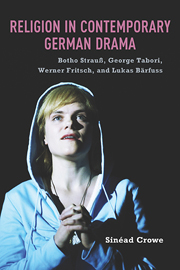 Religion in Contemporary German Drama
Religion in Contemporary German Drama Book contents
- Frontmatter
- Contents
- Acknowledgments
- Introduction: Definitions and Themes
- 1 The Relationship between Theater and Religion
- 2 Religion in Modern European Theater and Drama
- 3 “No One Wants to Get to God Anymore”? Botho Strauß's Groß und klein and Die eine und die andere
- 4 Theological Farce: George Tabori's Mein Kampf
- 5 “The Last Refuge for Metaphysics”: Werner Fritsch's Theater Theory
- 6 “The Feeling of Faith”: Fritsch's Wondreber Totentanz and Aller Seelen
- 7 Belief and Unbelief in the Twenty-First Century: Lukas Bärfuss's Der Bus (Das Zeug einer Heiligen)
- Conclusion
- Bibliography
- Index
7 - Belief and Unbelief in the Twenty-First Century: Lukas Bärfuss's Der Bus (Das Zeug einer Heiligen)
Published online by Cambridge University Press: 05 May 2013
- Frontmatter
- Contents
- Acknowledgments
- Introduction: Definitions and Themes
- 1 The Relationship between Theater and Religion
- 2 Religion in Modern European Theater and Drama
- 3 “No One Wants to Get to God Anymore”? Botho Strauß's Groß und klein and Die eine und die andere
- 4 Theological Farce: George Tabori's Mein Kampf
- 5 “The Last Refuge for Metaphysics”: Werner Fritsch's Theater Theory
- 6 “The Feeling of Faith”: Fritsch's Wondreber Totentanz and Aller Seelen
- 7 Belief and Unbelief in the Twenty-First Century: Lukas Bärfuss's Der Bus (Das Zeug einer Heiligen)
- Conclusion
- Bibliography
- Index
Summary
AWARDED GERMANY'S MOST PRESTIGIOUS theater award, the Mülheim Dramatists' Award, and selected by the journal Theater heute as the best play of 2005, Swiss playwright Lukas Bärfuss's Der Bus (Das Zeug einer Heiligen) was by far the most celebrated of the wave of plays exemplifying the “return” of religion to the German theater in the 2000s. Acclaimed for raising urgent questions about secularity, faith, morality, and meaning in the twenty-first century, it consolidated Bärfuss's reputation as a provocative young playwright whose work tackles the most topical issues. A reviewer for Die Welt, for example, described the play as “ein fulminantes, in seiner Rückbesinnung auf den Sinn- und Glaubensverlust der westlichen Welt hoch brisantes Stück” (a brilliant and, with its reflections on the loss of meaning and faith in the Western world, highly explosive play). Meanwhile Katharina Keim emphasized the innovative character of the play's “Blick auf den Einbruch des Religiösen in unsere heutige Welt” (examination of the intrusion of the religious into our contemporary world). As we have seen elsewhere in this study, however, concerns about the loss of meaning, ethics, and spirituality in a supposedly secular society have long been an important point of interest for Germanlanguage playwrights. We have also seen that the intrusion of religion into everyday life has been an important theme in the drama of Botho Strauß for many years. One of the key issues I will investigate in this chapter, then, is whether the claims made for the originality of Der Bus have been exaggerated, or whether the play does indeed offer an innovative engagement with religion that is especially relevant to the twenty-first century.
- Type
- Chapter
- Information
- Religion in Contemporary German DramaBotho Strauß, George Tabori, Werner Fritsch, and Lukas Bärfuss, pp. 131 - 142Publisher: Boydell & BrewerPrint publication year: 2013
